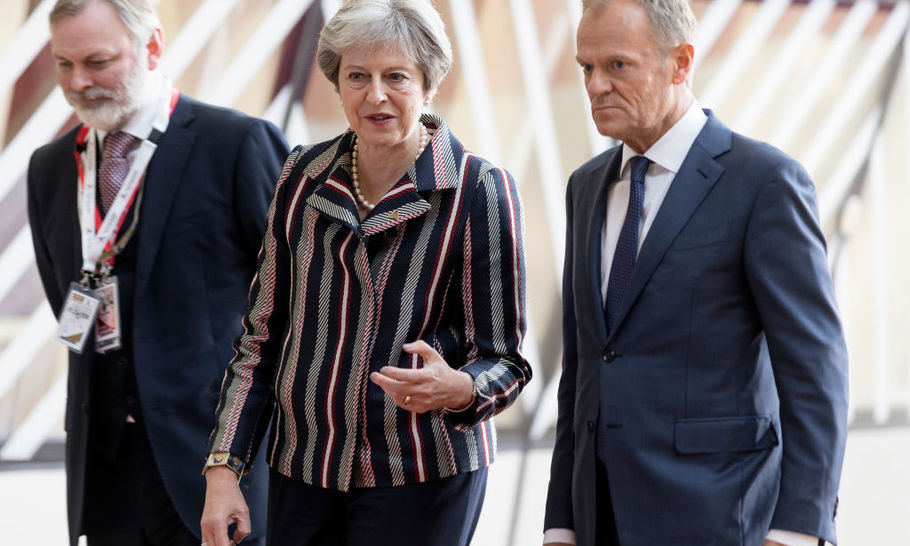The Prime Minister now has more bargaining power than ever before. Will she use it?

Thierry Monasse/Getty Images
The House of Commons has lived up to its reputation as the mother of Parliaments. After the passage of the Brady amendment on Tuesday evening, Theresa May now has a fighting chance of renegotiating the Withdrawal Agreement with the European Union, by replacing the backstop with a new solution to the Irish border problem. The question now is: can she offer something that is so obviously superior to the backstop that not only Brussels but even Dublin can be induced to accept it?
It helps to understand how we got here. Last night one of Angela Merkel’s lieutenants, Norbert Roettgen, told Newsnight that the EU had shown “great flexibility” and hence could offer no further concessions. Roettgen gave no examples of such concessions. The truth is that there are none. Michel Barnier has shown virtually no flexibility and has treated the UK throughout as though it had already left the EU. The backstop amounts to a loss of sovereignty to which Mrs May should never have agreed. It would mean that Northern Ireland would remain part of the single market, while Britain would be tied to the customs union — thereby dividing the UK and negating one of the main benefits of Brexit: the right to make free trade deals with the rest of the world.
The Irish government led by Leo Varadkar was able to impose such an unbalanced solution only because it had the weight of the EU behind it. Once the logic of the backstop had been embraced by Brussels, the way was open to keep Britain inside the customs union. The Belfast (Good Friday) Agreement gives the Republic a legitimate interest in Northern Ireland, but the backstop would effectively grant it the power to stop Brexit from taking effect north of the border, in the teeth of opposition from the Democratic Unionist Party. That such a diktat would be contrary to the spirit of the Agreement matters little to Dublin and even less to Brussels.
Now, however, the Commons vote has altered the dynamics. Mrs May will return to Brussels, with the sword of Damocles — Brexit without a deal — still hanging over the EU. She says she will be constructive; surely it is incumbent on the Eurocrats to be the same. If she can offer a replacement for the backstop that avoids a hard border but protects the interests of both sides, it would be irresponsible for the EU not to consider it.
Fortunately, there is a simple solution that achieves this. Northern Ireland should become a Free Trade Area. This would guarantee the same access for goods and services as membership of the single market and customs union, but preserve British sovereignty. The Province would still have a special status, but there would be no ambiguity about Brexit and no border in the Irish Sea. As a Free Trade Area, Northern Ireland would become a magnet for international investment and human capital. The British and Irish would both benefit from the prosperity that would follow.
There was never much likelihood that the whole UK would become a Singapore on the edge of the European Continent. However much free trade would be in our interests, protectionist pressures tend to prevail in the politics of large countries. But Northern Ireland is much more comparable in scale to Singapore. True, the legacy of the Troubles still lies heavy on the politics of the Province. The Assembly has not met at Stormont for years, the Executive is suspended, and direct rule from London is merely a stopgap. But the prospect of unprecedented prosperity might kickstart the political process there too.
Everything now depends on the Prime Minister. If she can appeal to the public over the heads of the politicians, there may yet be a deal to be done. She should give television interviews in Berlin and Paris to explain her position. The only thing that will persuade her counterpart in Dublin to climb down would be pressure from the EU. Thanks to the imminent threat of no-deal, she is in a stronger bargaining position than ever before. The indicative vote in the Commons against no-deal does not remove it from the negotiating table. Neither side wants it, but it will happen unless Brussels blinks. A free trade solution to the Irish border problem may not sound exciting. But a British Prime Minister who uses the power of the English language to reach out to our 27 partners could still capture the imagination of Europe.





